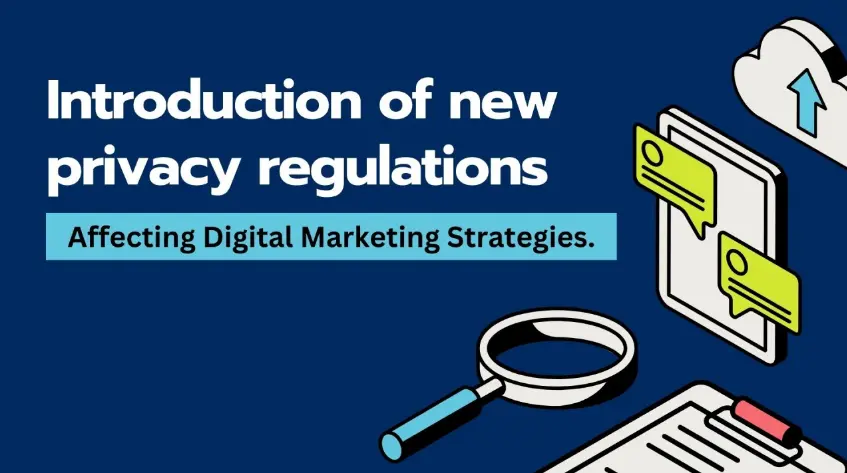As digital marketing continues to evolve, privacy laws have become more stringent. These laws are reshaping how businesses operate. In other words, the privacy concerns are increasing, making it essential for marketers to ensure privacy.

Let’s delve into the impact of privacy laws on digital marketing strategies.
Table of contents
Understanding Privacy Laws
Privacy laws are regulations that govern how businesses collect, store, and use personal data. They aim to protect consumer privacy and ensure that businesses handle data responsibly.
Key privacy laws include the General Data Protection Regulation (GDPR) in Europe, the California Consumer Privacy Act (CCPA) in the US, and the Personal Data Protection Act (PDPA) in Singapore. Each law has specific requirements that businesses must follow.
Compliance with Privacy Laws
Steps to Ensure Compliance

To comply with privacy laws, businesses should:
- Understand the specific requirements of relevant laws.
- Implement data protection measures.
- Regularly review and update privacy policies.
- Train employees on data protection practices.
Penalties for Non-Compliance
Non-compliance can lead to severe penalties, including hefty fines and legal action. For instance, the GDPR can impose fines of up to 4% of annual global turnover or €20 million, whichever is higher.

Impact on Digital Marketing
Privacy laws have altered data-driven marketing. Marketers now have access to less data, making it harder to personalize campaigns. This shift requires innovative strategies to engage consumers effectively.

Marketers must adapt by focusing on transparency and building trust. Strategies should emphasize obtaining clear consent and providing users with control over their data.
Consent and Transparency
User consent is crucial under privacy laws. Marketers must clearly explain why they are collecting data and how it will be used. Gaining explicit consent builds trust and ensures compliance. Transparency about data practices is essential. Businesses should communicate openly about their data policies and provide easy access to privacy information, fostering consumer trust.
Challenges for Marketers
Adapting to new regulations can be challenging. Marketers must stay updated on changing laws and adjust their strategies accordingly, which requires continuous learning and flexibility. Maintaining personalization in marketing while complying with privacy laws is tough. Marketers need to find creative ways to engage consumers without relying heavily on personal data.
Adapting to New Regulations: Staying updated on changing laws requires continuous learning and flexibility.
Maintaining Personalization: Engaging consumers creatively while complying with privacy laws is challenging.
Data Management: Ensuring data accuracy and security demands significant resources and attention.
Technology Integration: Keeping up with and integrating new marketing technologies can be complex and costly.
Opportunities in Privacy Compliance
Complying with privacy laws can enhance consumer trust. When businesses demonstrate a commitment to protecting privacy, they build stronger relationships with their customers. Businesses that prioritize privacy compliance can gain a competitive advantage. Consumers are more likely to choose companies that they trust to handle their data responsibly.
Tools and Technologies for Compliance
Privacy management software helps businesses track and manage compliance. These tools can automate processes, ensuring that data practices align with legal requirements. Data anonymization techniques can protect consumer privacy while allowing businesses to analyze data. By removing personally identifiable information, companies can mitigate privacy risks.
Future Trends in Privacy Laws

Anticipating New Regulations
Privacy laws will continue to evolve. Marketers should anticipate new regulations and prepare to adapt their strategies to remain compliant.
Adapting to Future Changes
Adapting to future changes in privacy laws requires proactive planning. Businesses should stay informed about potential regulatory updates and be ready to implement necessary adjustments.
Best Practices for Marketers
| Best Practices | Explanation |
| Transparent Data Collection | Clearly outline what data is collected from users and how it will be used. Transparency builds trust and ensures users are informed about their data’s usage. |
| User-Friendly Privacy Policies | Write privacy policies in simple, plain English, making them easy for users to understand. Avoid legal jargon and ensure the document is accessible to everyone. |
| Data Protection Measures | Implement strong data protection measures, such as encryption and secure storage. Regularly update these measures to guard against new threats and vulnerabilities. |
| Regular Privacy Audits | Conduct routine audits to review and assess data handling practices. Audits help identify potential compliance issues and ensure continuous adherence to privacy laws. |
| Employee Training Programs | Provide ongoing training sessions for employees on privacy laws and best practices. Regular training ensures employees are aware of the latest regulations and techniques for data protection. |
Conclusion
Privacy laws have a profound impact on digital marketing strategies. While they pose challenges, they also offer opportunities to build trust and gain a competitive edge. By prioritizing compliance and transparency, businesses can navigate the evolving landscape of privacy regulations successfully.
Read more : How to Use Keywords Effectively in Your SEO Strategy
FAQs
Privacy laws are regulations that govern how personal data is collected, stored, and used to protect consumer privacy.
Privacy laws affect digital marketing by restricting data collection and requiring explicit user consent, leading to changes in marketing strategies.
Key privacy laws include the GDPR in Europe, the CCPA in the US, and the PDPA in Singapore.
User consent is important because it ensures that data collection practices are transparent and respectful of consumer privacy, building trust.


